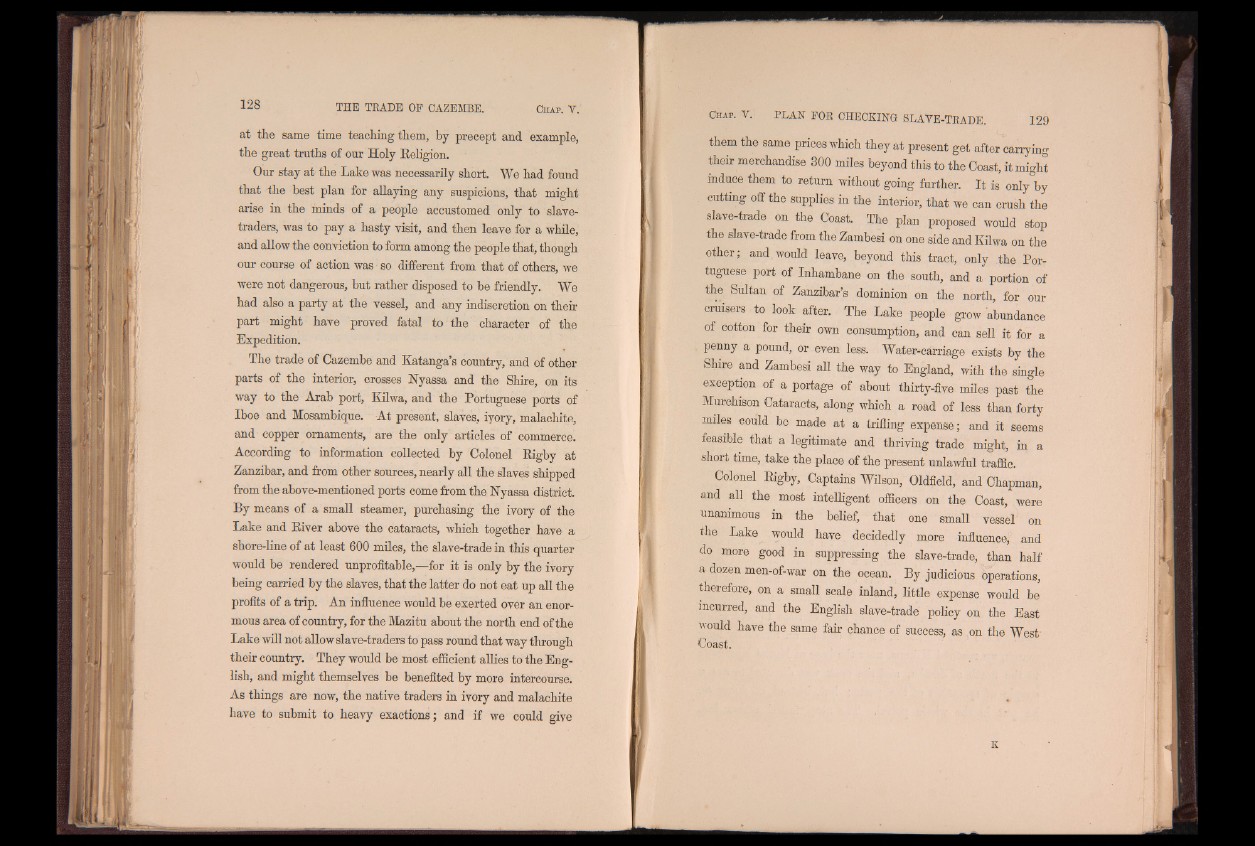
at the same time teaching them, by precept and example,
the great truths of our Holy Religion.
Our stay at the Lake was necessarily short. We had found
that the best plan for allaying any suspicions, that might
arise in the minds of a people accustomed only to slave-
traders, was to pay a hasty visit, and then leave for a while,
and allow the conviction to form among the people that, though
our course of action was so different from that of others, we
were not dangerous, but rather disposed to be friendly. We
had also a party at the vessel, and any indiscretion on their
part might have proved fatal to the character of the
Expedition.
The trade of Cazembe and Katanga’s country, and of other
parts of the interior, crosses Nyassa and the Shire, on its
way to the Arab port, Kilwa, and the Portuguese ports of
Iboe and Mosambique. At present, slaves, iyory, malachite,
and copper ornaments, are the only articles of commerce.
According to information collected by Colonel Rigby at
Zanzibar, and from other sources, nearly all the slaves shipped
from the above-mentioned ports come from the Nyassa district.
By means of a small steamer, purchasing the ivory of the
Lake and River above the cataracts, which together have a
shore-line of at least 600 miles, the slave-trade in this quarter
would be rendered unprofitable,—for it is only by the ivory
being carried by the slaves, that the latter do not eat up all the
profits of a trip. An influence would be exerted over an enormous
area of country, for the Mazitu about the north end of the
Lake will not allow slave-traders to pass round that way through
their country. They would be most efficient allies to the English,
and might themselves be benefited by more intercourse.
As things are now, the native traders in ivory and malachite
have to submit to heavy exactions; and if we could give
C h a p . V. PLAN FOB CHECKING SLAVE-TEADE. 129
them the same prices which they at present get after carrying
their merchandise 300 miles beyond this to the Coast, it might
induce them to return without going further. I t is only by
cutting off the supplies in the interior, that we can crush the
slave-trade on the Coast. The plan proposed would stop
the slave-trade from the Zambesi on one side and Kilwa on the
other; and would leave, beyond this tract, only the Portuguese
port of Inhambane on the south, and a portion of
the Sultan of Zanzibar’s dominion on the north, for our
cruisers to look after. The Labe people grow abundance
of cotton for their own consumption, and can sell it for a
penny a pound, or even less. Water-carriage exists by the
Shire and Zambesi all the way to England, with the single
exception of a portage of about thirty-five miles past the
Murchison Cataracts, along which a road of less than forty
miles could be made at a trifling expense; and it seems
feasible that a legitimate and thriving trade might, in a
short time, take the place of the present unlawful traffic.
Colonel Rigby, Captains Wilson, Oldfield, and Chapman,
and all the most intelligent officers on the Coast, were
unanimous in the belief, that one small vessel on
the Lake would have decidedly more influence; and
do more good in suppressing the slave-trade, than half
a dozen men-of-war on the ocean. By judicious operations,
therefore, on a small scale inland, little expense would be
incurred, and the English slave-trade policy on the East
would have the same fair chance of success, as on the West
Coast.